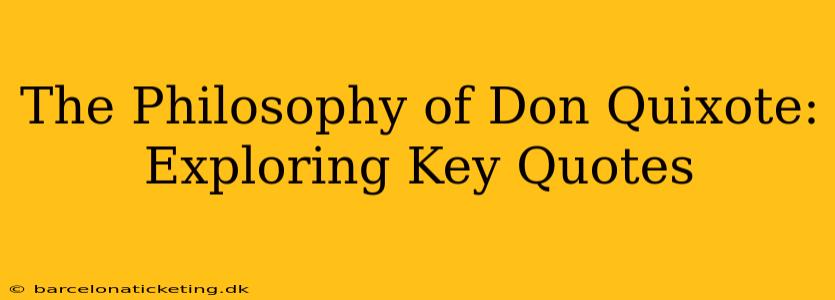Don Quixote, Cervantes's immortal masterpiece, is more than just a swashbuckling adventure; it's a profound exploration of human nature, idealism, reality, and the very nature of existence. While ostensibly a comedic tale, its philosophical underpinnings are rich and complex, offering endless avenues for interpretation. By examining key quotes from the novel, we can delve into the heart of Don Quixote's philosophy and understand its enduring relevance.
What is the main philosophical idea in Don Quixote?
The central philosophical idea in Don Quixote revolves around the conflict between idealism and realism, fantasy and reality. Don Quixote, consumed by his chivalric romances, lives in a world of his own making, interpreting reality through the lens of his literary ideals. This creates a constant tension between his fantastical perceptions and the mundane realities of the world around him. Cervantes masterfully uses this conflict to explore the human capacity for delusion, the power of imagination, and the importance of finding a balance between dreams and the practicalities of life. The novel doesn't advocate for one side over the other; instead, it presents a nuanced examination of both, leaving the reader to ponder their own relationship with idealism and reality.
What are the key themes in Don Quixote?
Several key themes intertwine to create the philosophical tapestry of Don Quixote:
-
Idealism vs. Realism: This is the most prominent theme, as Don Quixote's unwavering commitment to his chivalric ideals constantly clashes with the harsh realities of his world. His misinterpretations of everyday occurrences, such as windmills as giants, highlight the dangers of unchecked idealism.
-
The Power of Imagination: Don Quixote's imagination is both his strength and his weakness. It allows him to create a rich inner world and find meaning in the ordinary, but it also leads him to misinterpret reality and experience profound disappointment. The novel suggests that imagination, while vital, needs to be grounded in a degree of self-awareness.
-
The Nature of Reality: Don Quixote questions the very definition of reality. Is it what we perceive with our senses, or is it shaped by our beliefs and expectations? Don Quixote's experiences suggest that reality is subjective and can be dramatically altered by individual perspectives.
-
Madness and Sanity: The novel blurs the lines between madness and sanity. Is Don Quixote truly mad, or is he simply more perceptive than those around him, seeing a deeper truth hidden beneath the surface of everyday life? This ambiguity adds to the philosophical richness of the work.
-
The Quest for Meaning: Despite his flaws and delusions, Don Quixote's relentless pursuit of his chivalric ideals reveals a deep-seated desire for meaning and purpose. His journey, though often comical, is ultimately a profound search for significance in a seemingly meaningless world.
What are some of the most important quotes from Don Quixote?
Many quotes from Don Quixote encapsulate its philosophical depth. While pinpointing the most important is subjective, several stand out for their enduring relevance:
-
"It is better to be a lion than a sheep." This quote speaks to the importance of courage, conviction, and standing up for one's beliefs, even in the face of adversity. It emphasizes the value of idealism, albeit tempered by the novel's overall message.
-
"To dream the impossible dream." This iconic phrase, often quoted separately from its context, highlights the allure and power of pursuing seemingly unattainable goals. It captures the essence of Don Quixote's spirit and the human desire for something greater than ourselves.
-
"I'd rather die on my feet than live on my knees." This emphasizes Don Quixote's fierce independence and his refusal to compromise his values. It reinforces the theme of unwavering commitment to one's ideals, even when facing significant challenges.
How does Don Quixote's philosophy continue to resonate today?
Don Quixote's philosophy continues to resonate today because its central themes—the conflict between idealism and realism, the power of imagination, and the search for meaning—remain deeply relevant to the human condition. In a world increasingly dominated by pragmatism and cynicism, Don Quixote serves as a reminder of the importance of dreams, the power of imagination, and the enduring human desire to find purpose and meaning in life. His unwavering commitment to his ideals, though often misguided, inspires us to question our own perspectives and pursue our passions with unwavering conviction. His story reminds us that even in failure, there is value in striving for something greater than ourselves.
Are there any criticisms of Don Quixote's philosophy?
While Don Quixote's idealism is admirable, it's also important to acknowledge its potential downsides. His unwavering commitment to his fantastical worldview often leads to disastrous consequences, both for himself and for those around him. His inability to distinguish between fantasy and reality can be seen as a form of self-deception, potentially harmful to both his well-being and his relationships. The novel subtly critiques this aspect of his personality, showing the importance of finding a balance between idealism and pragmatism.
This exploration of Don Quixote's philosophy through its key quotes only scratches the surface of this complex and endlessly fascinating work. The novel's enduring appeal lies in its ability to provoke thought, inspire reflection, and challenge our own understanding of reality, idealism, and the human condition.

